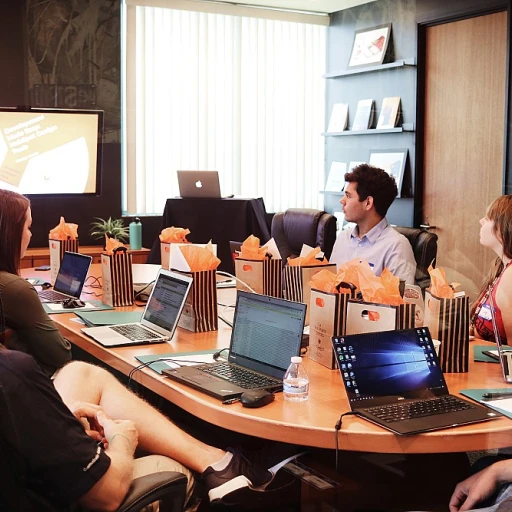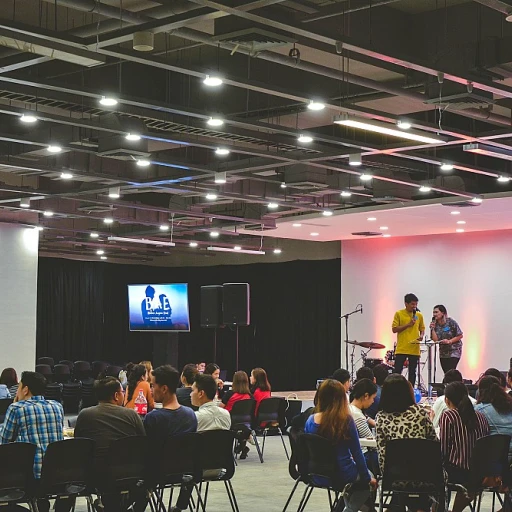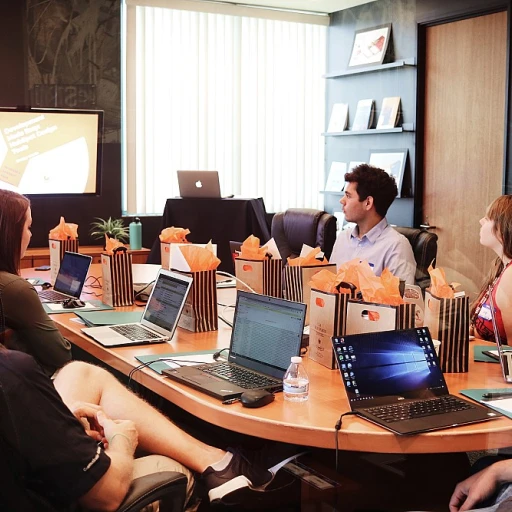
Understanding the Role of a Workplace Experience Manager
Unraveling the Core Responsibilities
The role of a Workplace Experience Manager has evolved significantly in today’s dynamic business world, especially in bustling cities like York. This position hinges on creating a positive employee experience while ensuring smooth office operations. As businesses strive to improve employee satisfaction and engagement, the demand for skilled experience managers, who can foster an environment where people thrive, is on the rise.
Essentially, the role requires an individual to be a master at management. They are tasked with the crucial responsibility of bridging the gap between the business objectives and the employees' needs, all within the confines of a strategic framework. This involves designing and implementing policies that enhance workplace culture, which can be particularly challenging in the context of hybrid work environments.
Key Challenges
A workplace manager today must juggle various tasks such as overseeing facilities management, human resources initiatives, and even the occasional real estate decision. The challenge lies in maintaining an inclusive, productive space that caters to both senior managers and early applicants alike.
Crafting effective boundaries in this role is vital. Without clear guidelines, the manager workplace risks succumbing to employee dissatisfaction, leading to higher attrition. A structured approach to employee engagement and satisfaction can mitigate this risk, making the Workplace Experience Manager a crucial partner in a company’s success.
Identifying Key Skills for Success
Key Competencies for Effective Workplace Experience Management
Transitioning into the role of a Workplace Experience Manager requires a focus on developing a diverse set of skills. This role encapsulates managing the intricacies of the workplace to enhance employee satisfaction, engagement, and overall experience. Developing expertise in people management is crucial. A workplace experience manager must facilitate smooth interactions among employees, fostering an environment of collaboration and respect. This requires not just people skills, but an understanding of employee behavior and the ability to adapt strategies based on employee feedback. Experience managers also need proficiency in operations and resource management. Coordinating various facets of workplace operations, such as facilities management and office resources, can directly impact employee experience. It's important to maintain optimal functionality of the office environment while incorporating elements of flexibility that the modern hybrid work model demands. An aptitude for strategic planning is beneficial. Experience managers are tasked with crafting initiatives that align with company goals, enhancing business efficiency and employee experience simultaneously. This involves analyzing data and trends to inform decision-making processes, ensuring the work environment adapts to both immediate and future needs of employees. Another key area is communication skills. Managers must communicate changes and innovations effectively, ensuring employees are informed and engaged. Strong communication fosters trust and helps unify the team’s objectives. Furthermore, proficiency in employee engagement is necessary. Understanding what motivates employees and how to increase their participation in workplace activities can lead to a more dynamic and productive work environment. Achieving success in the role of a Workplace Experience Manager requires a comprehensive set of skills tailored to managing the complexities of a modern office. A deep dive into developing these competencies is essential, and having a clear understanding of them can set a strong foundation in your reskilling journey. For more insights on enhancing your approach to management and setting boundaries effectively, consider exploring our detailed guide for leaders in reskilling.The Reskilling Journey: Where to Start
Mapping Your Reskilling Strategy
Embarking on a reskilling journey requires a well-thought-out strategy to transform into an accomplished workplace experience manager. This transformative path often begins with understanding where to start. Identifying the specific areas in which you need to enhance your skills is crucial. The fast-paced nature of workplace dynamics, especially in cities like York and its bustling business environments, means roles are continuously evolving.
A few years ago, a manager position primarily focused on operations and facilities management. Today, it demands a comprehensive view of employee experience and the human resources aspects that influence job satisfaction and engagement. An early applicant entering the field now may benefit from focusing not only on traditional management skills but also on the nuances of hybrid work formats and employee engagement strategies.
The first step in your strategy should be a thorough self-assessment of your current capabilities against the required competencies. Working closely with senior managers or a vice president can offer insights into the expectations for a role workplace transformation. Seeking feedback from partners and employees can also highlight areas for improvement.
Moreover, consider identifying challenges that might arise during your reskilling efforts, such as time constraints or limited access to resources. Identifying these obstacles ahead of time allows you to plan effectively and mitigate their impact on your growth journey.
For those ready to begin this transition, exploring resources that cater to change management and higher education might be particularly useful. Our comprehensive guide on navigating change management can serve as a valuable tool to understand how to apply learning and development principles to foster better workplace experiences.
Training and Educational Resources
Finding the Right Training Programs
Embarking on a reskilling journey to excel as a Workplace Experience Manager requires tapping into the right training and educational resources. Understanding the role involves juggling multiple responsibilities, from real estate planning to employee engagement, which can be daunting without proper guidance. Here's how you can make the most of the resources at your disposal:- Online Courses and Workshops: Many learning platforms now offer specialized courses tailored to modern workplace dynamics. These courses focus on essential skills such as facilities management, employee satisfaction, and hybrid work management. Platforms like Coursera and LinkedIn Learning provide valuable resources tailored for the specific needs of managers and senior employees alike.
- Industry Seminars and Conferences: Participating in seminars and conferences provides direct insight into the latest trends in workplace management. It's also an opportunity to network with other experience managers who share similar challenges and successes, offering a supportive community for reskilling.
- In-house Training Programs: Some organizations may offer internal training programs designed to upskill employees. These can be particularly beneficial if they include mentorship from senior managers or collaboration with different departments such as human resources or operations, allowing a practical understanding of the business's inner workings.
- Certificate Programs: Obtaining a certificate in specialized areas, like business management or employee experience, can add a significant competitive edge. Many institutions in major cities, such as New York City, offer these programs aimed at advancing professional careers in a short span.
- Books and Articles: Don't underestimate the power of a well-crafted book or article. Many industry leaders and senior managers publish their insights on improving employee experience and workplace management, which can serve as both inspiration and guidance.
Overcoming Challenges in Reskilling
Confronting Reskilling Obstacles and Finding Solutions
Reskilling is a dynamic journey that requires dedication, especially when aiming to excel in a workplace experience manager role. However, there are numerous challenges that people encounter along the way. Understanding these obstacles can foster a more systematic approach to overcoming them. One common challenge is managing expectations, both personally and at a senior managerial level. Transitioning into new roles may bring an overwhelming range of responsibilities, particularly in fast-paced environments like York City, where businesses thrive on quick adaptations to workplace changes. Finding a balance between upskilling and maintaining current operations is essential. Moreover, the shift from a traditional workplace approach to hybrid work arrangements can complicate the employee experience. Ensuring seamless employee engagement while moving between in-office and remote environments challenges even the most seasoned workplace managers. This transition demands a strong understanding of both human resources and facilities management. Another major hurdle is the accessibility of resources. Individuals may face difficulty in identifying suitable training opportunities tailored to their specific career paths. Resources related to real estate and privacy policy management, for instance, may be pivotal in understanding the broader scope of an experience coordinator's role. For this reason, having a reliable partner in learning—be it a mentor, a senior manager, or a learning institution—is invaluable. Lastly, psychological challenges, such as self-doubt and fear of inadequacy, often accompany reskilling efforts. It's common for early applicants to question their capabilities when stepping into new or advanced roles. Building confidence through small, incremental progress and celebrating achievements along the journey can mitigate these feelings. As you navigate these challenges, consider actively engaging with networks that provide support and encouragement. Workplace communities centered on learning and skill development, like employee satisfaction groups or forums, offer the chance to learn from others' experiences and gain insights into successfully managing job transitions.Opportunities and Career Growth
The Path to Advancement in Workplace Experience Management
As reskilling becomes an increasingly essential aspect of career growth, the opportunities stemming from a role in workplace experience management are both diverse and promising. With the evolving landscape of business operations in environments like New York City and beyond, those aiming to excel as workplace experience managers, partners, or coordinators are finding new pathways to enhance their careers.
Diverse Opportunities
Individuals delving into this field will discover that the role of a workplace manager does not confine them strictly to traditional office settings. Instead, it spans across realms including facilities management, real estate, and even senior management positions where they can influence employee engagement and satisfaction. As hybrid work models gain traction, the demand for effective management of employee experiences within both virtual and physical office setups is on the rise.
Networking and Learning
Building connections with other professionals in the industry serves as a crucial step in career advancement. Engaging with senior managers and attending relevant workshops or seminars provides valuable insights and experiences that can be applied in your own role as an experience manager. There are also numerous resources available for continuous learning to keep abreast of the latest in workplace management and employee experience trends.
Climbing the Career Ladder
From early applicants to those holding senior roles, the pathway to career progression involves not just enhancing technical skills but also developing leadership qualities. Many experience managers find themselves transitioning to roles such as vice president or partners within organizations, where they are responsible for broader strategic management and decision-making.
By focusing on both personal and professional development, individuals in the workplace experience field can open doors to greater responsibilities and impactful roles that shape the future of employee engagement and business operations. As you navigate this journey, consider continually refining your skills and competencies to align with the ever-changing dynamics of the workplace.













